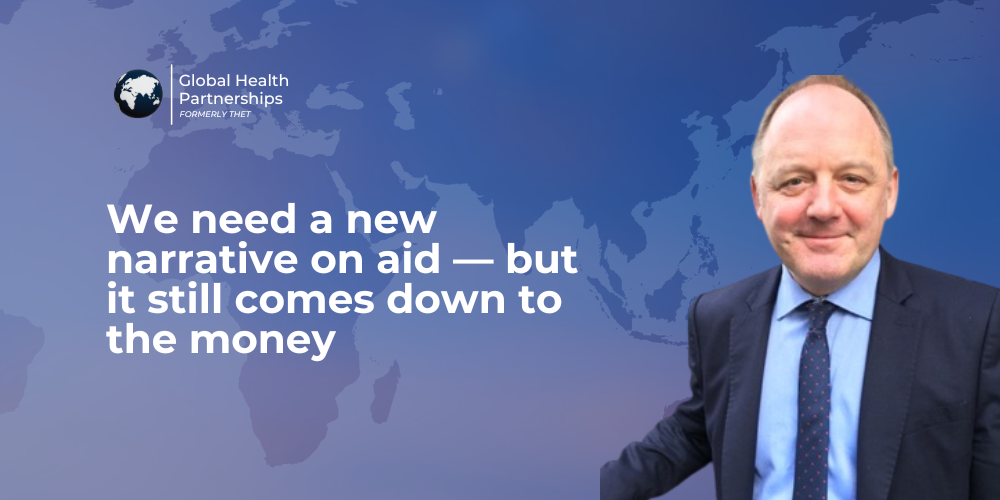We need a new narrative on aid — but it still comes down to the money
21 May 2025

The re-establishment of the All-Party Parliamentary Group (APPG) on Global Health and Security last week is both timely and essential. It brings fresh energy to the task of repositioning the UK as a global leader in health – not through nostalgic discussions on aid, but through the pursuit of modern, equitable partnerships grounded in mutual interest. But if we are to move from words to action, we must begin with an honest assessment of how the UK benefits economically, socially, and in terms of security, from being globally engaged in health.
The UK has a proud history in advancing universal health coverage around the world. As outlined in the policy paper, The UK’s Contribution to Health Globally, we are a powerhouse of research, innovation, and policy leadership. Our universities, life sciences sector, National Health Service and NGOs are world-class. But critically, these sectors also deliver direct and measurable benefits to the UK. They are not acts of benevolence, but vehicles for achieving shared health, economic, and geopolitical goals. They can train the health workers we need. They can open markets for British science and innovation. And they can strengthen the global safety net that protects us all.
Take the health workforce. The NHS is the world’s largest publicly funded health system, employing 1.4 million people. One in five NHS workers reports a non-British nationality. These individuals bring enormous talent to the UK, but they also represent a major cost saving. It costs approximately £327,000 to train a doctor in the UK to Foundation Year 1. Recruiting doctors and nurses trained overseas has saved the UK taxpayers hundreds of millions of pounds.
Take global security. Global health threats, from infectious diseases to increased antimicrobial resistance, have shown us that preparedness and collective action is imperative. As the Covid-19 pandemic brought into sharp focus: disease does not respect borders. Our best defence lies in strong health systems around the world, equipped to detect, respond to, and contain outbreaks. This is where UK expertise in research, public health, and health system development has a vital role to play in helping to protect our own gains in health and life expectancy achieved over the past 100 years.
This is precisely the direction UK voters support. Polling from More in Common in March 2025 showed that a majority of voters across the political spectrum back aid that advances British interests:
- 60% agree aid contributes to economic growth
- 62% say it strengthens national security
- 59% believe it improves public health and pandemic prevention
Moreover, 65% believe UK aid should be aligned with British priorities. This is not a barrier—it is an opportunity. It gives the government a mandate to reframe aid as investment in the UK’s own health, economic resilience, and global leadership.
And that is what our global partners want.
At the UK-Africa Health Summit organised by my organisation in March this year, there was no nostalgia for old-style aid. Instead, delegates from several African nations and Ministers of Health, demonstrated a strong appetite for equitable and mutually beneficial partnerships that reflect shared ambitions.
In short: not charity, but collaboration. Not dependence, but mutual benefit.
At the Summit we explored, in particular, how Health Partnerships between the UK and overseas health systems are advancing this equitable partnership agenda. We drew on the findings of a recent report by Global Health Partnerships (formerly THET) which looks at how Health Partnerships strengthen the skills of frontline health workers, improve governance and clinical quality in partner countries, whilst generating fresh ideas and innovations that can benefit the UK.
But let’s be clear: sharing expertise alone is not enough. International Development Minister, Baroness Chapman said this week that the government intends to shift focus from aid to “sharing British expertise.” That’s a start, but not a solution. Expertise without investment will not deliver results. Training nurses in Sierra Leone or strengthening Kenya’s health workforce cannot be done with goodwill alone. It requires funding, infrastructure, and long-term commitment.
This is why the APPG on Global Health and Security is so important. It can help clarify what “modern partnership” really means. It can scrutinise how global health fits within broader government missions on science and technology, education, security, and trade. And it can advocate for a funding model that matches ambition with action.
At Global Health Partnerships, we stand ready to support this work. We bring evidence of what partnerships achieve. We can connect the UK with partners from the Global South who are eager to share their perspectives. And as an INGO with deep roots in health systems across Africa and Asia, we can lend our voice to advancing this agenda.
The UK has long been a global leader in health. We have the universities, the research institutes, the industries, and the NHS to prove it. But leadership requires investment. If we want a world that is healthier, safer, and more equitable – one that also protects British interests – we must be willing to fund that future.
In the end, the shift from aid to partnership is welcome. But let’s not pretend it comes cheap. If the UK benefits from global health (and it clearly does) then it must pay its fair share. That is the honest reckoning this new narrative requires.


1 Comment
Leave a comment
Your email address will not be published.